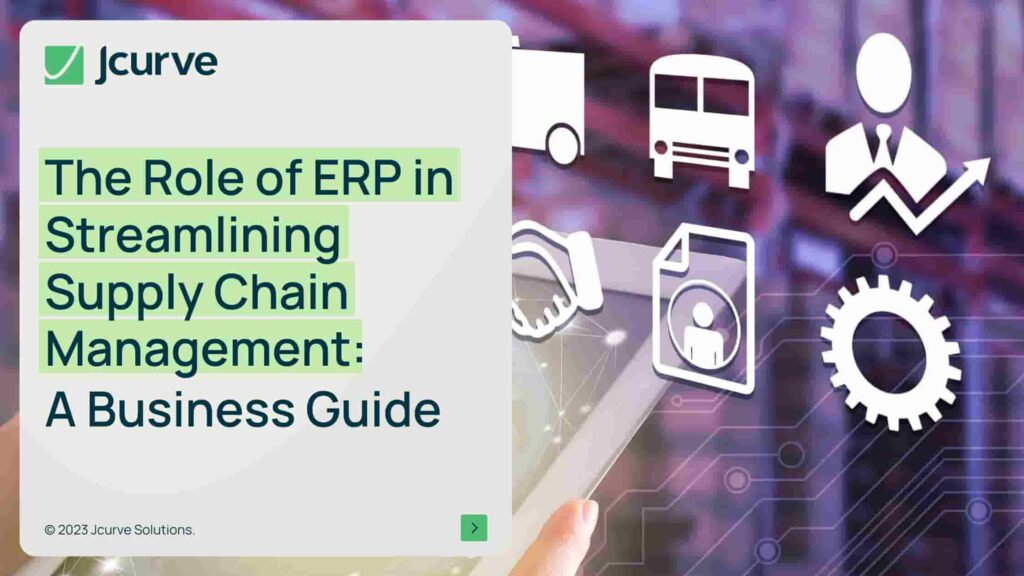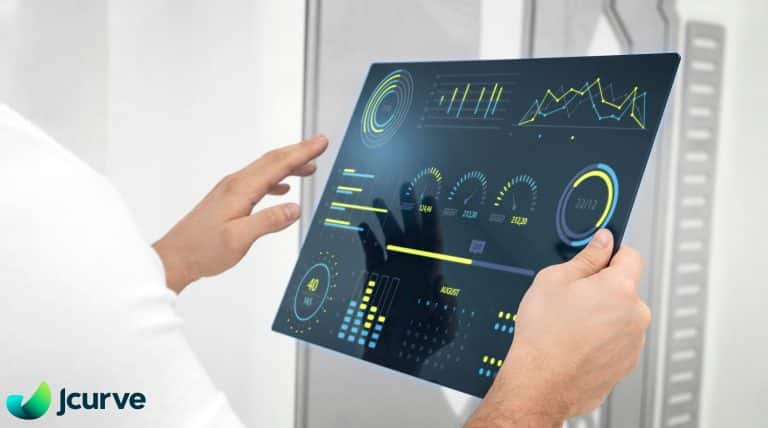Within the framework of ERP systems, the supply chain serves as the backbone, seamlessly converting raw materials into final products and ensuring their timely delivery to customers. This integration is pivotal in synchronizing business operations to fulfil sales orders efficiently, aligning with consumer expectations while maintaining cost-effectiveness.
The management of this intricate process, from analyzing market demand to the procurement of materials, and through to the manufacturing process and distribution phases, is adeptly handled by the ERP modules, such as those offered by NetSuite and Jcurve Solutions.
By amalgamating various functions including planning, procurement, and inventory management, alongside overseeing manufacturing and warehousing operations, ERP systems like NetSuite empower businesses to refine and expedite their supply chain workflows, ensuring an unbroken chain from order receipt to fulfilment.
The intersection of Enterprise Resource Planning (ERP) and Supply Chain Management (SCM) marks a pivotal evolution in how businesses streamline operations, reduce costs, and enhance service delivery. With the rise of global markets and the increasing complexity of supply chains, the integration of ERP systems within supply chain management has become not just beneficial but essential.
Key Aspects of ERP in Supply Chain Management
1. Holistic Integration of Business Processes
- Seamless connection between finance, operations, and supply chain
- End-to-end visibility from order to delivery
- Elimination of data silos and information gaps
2. Real-time Visibility and Data-driven Decision Making
- Up-to-the-minute insights on inventory, orders, and shipments
- Data-backed forecasting and planning
- Instant access to KPIs and performance metrics
3. Automation and Optimization of Supply Chain Processes
- Streamlined procurement and order fulfillment
- Automated inventory management and reordering
- Optimized routing and logistics planning
4. Flexibility and Scalability to Adapt to Changing Business Needs
- Customizable modules to fit specific industry requirements
- Ability to add new functionalities as the business grows
- Rapid adaptation to market changes and new regulations
5. Enhanced Collaboration Across the Supply Chain
- Improved communication with suppliers and partners
- Shared access to relevant data and forecasts
- Collaborative planning and issue resolution
What is the Role of ERP within Supply Chain Management?
ERP systems offer a holistic view of a company’s operations, integrating various functions like procurement, manufacturing, sales, and finance into a single, coherent framework. This integration is crucial for supply chain management, as it allows for real-time information across the entire supply chain.
- Demand Planning Integration: ERP systems enhance supply chain management by integrating advanced demand planning tools. These tools allow businesses to forecast demand more accurately, ensuring that inventory levels are aligned with future sales projections. This integration supports efficient resource allocation, minimizing waste and ensuring that products are available when and where they are needed.
- Procurement and Manufacturing: ERP systems significantly improve the cohesion between procurement and manufacturing processes by automating operations to streamline order placement, minimize lead times, and sustain ideal inventory quantities. This automation enhances production scheduling, resource optimization and quality control. Enhanced with dashboards and reports, these systems provide immediate visibility into expenditure and supplier efficacy, facilitating informed decision-making. These may encompass metrics like lead times, punctuality of deliveries, accuracy of orders, among others.
- Inventory Management: ERP systems are crucial in optimizing inventory and warehouse management. They provide real-time visibility into inventory levels, and stock movements, or predict any future inventory needs. This leads to reduced carrying costs, minimized overstock, and understock situations, and improved order fulfillment rates.
- Warehouse management: Enhances supply chain operations by optimizing warehouse space and streamlining order processing, integrating systems to automate inventory and routing tasks.
- Order Management: Through centralized order management, ERP systems consolidate orders from various channels, enabling efficient processing, tracking, and fulfillment. This ensures that customer orders are completed accurately and delivered on time, increasing customer satisfaction and loyalty.
- Flexibility in Adapting to Business Dynamics: ERP systems offer flexibility, enabling businesses to adapt quickly to market changes, supply chain disruptions, or evolving customer needs. This adaptability ensures that businesses remain resilient, maintaining continuous operations and competitive advantage in a dynamic market environment.
Top 10 uses of ERP Systems for Supply Chain Management
1. Streamlined Supply Chain Planning
ERP systems enhance supply chain agility by providing immediate visibility into inventory levels, order statuses, and demand forecasts. This critical insight supports strategic resource allocation, ensuring a balance between meeting production schedules and reducing overhead costs, while also facilitating swift adaptations to improve service delivery and operational efficiency.
2. Automated Processes
By automating key procurement activities, ERP solutions refine the supplier selection process, streamline purchase order creation, and foster stronger supplier partnerships. Automation leads to fewer errors and a faster procurement timeline, contributing to a more efficient and responsive supply chain.
3. Route Optimization
ERP systems can design efficient delivery routes considering various factors like delivery locations and traffic patterns, reducing transportation costs and delivery times.
4. Real-Time Analytics and Reporting
ERP offers accurate real-time data analytics, enabling companies to track supply chain metrics and KPIs for better decision-making.
5. Supplier Management
ERP improves supplier management by centralizing data and fostering collaboration with suppliers, which strengthens relationships and opens up cost-saving opportunities.
6. Evaluating Vendor Performance
ERP systems facilitate the assessment of vendor performance, aiding in better strategic choices and improvements in supply chain efficiency.
7. Complete Visibility of the Supply Chain Network
ERP unifies supply chain and production management, enabling stakeholders to track raw materials, inventory, and product deliveries in real-time. It offers enterprise-wide visibility and insights, allowing for streamlined adjustments in logistics and manufacturing.
8. Improved Collaboration
ERP systems foster enhanced collaboration by integrating internal and external supply chain partners into a single database, allowing teams from sales to inventory to share and access vital information in real-time,
9. Customization and Scalability
Modern ERP systems are adaptable and scalable, making them ideal for businesses of various sizes and industries. They can be customized to meet specific business needs with customizable dashboards and reports, ensuring that as a company grows, its ERP system can grow with it.
10. Material management
MRP (Material Requirements Planning) software streamlines production planning by accurately forecasting the needs for materials and resources. It reduces inventory costs by synchronizing sales data, inventory counts, and production timelines to accurately determine the necessary materials and their required delivery schedules.
Benefits of Integrating ERP with Supply Chain Management
- Enhanced Visibility and Control: ERP systems offer a comprehensive overview of the supply chain, allowing managers to precisely monitor inventory, track shipments and coordinate production schedules.
- Minimized Costs: Cloud-based ERP systems streamline operations by automating routine tasks and refining workflows, substantially cutting down on operational, shipping, and production costs. For example, a manufacturing firm can leverage integrated data to decrease excess inventory and improve delivery times, thereby reducing operational costs and simultaneously enhancing service quality.
- Increased Responsiveness: Using predictive analytics, ERP systems help anticipate market demand shifts and supply chain disruptions, leveraging historical data for forecasting and bottleneck identification.
- Better Collaboration and Information Sharing: ERP enhances collaboration across departments and with external partners by providing uniform access to data and insights.
- Compliance and Risk Management: With comprehensive tracking and reporting features, ERP systems help businesses comply with regulatory requirements and manage risks more effectively.
- Personalization and Customer Experience: ERP systems empower businesses to meet specific customer needs more effectively, providing the flexibility to customize products and services. This capability enhances the customer experience, fostering loyalty and differentiation in a competitive market.
Advanced Capabilities and Emerging Trends in ERP for Supply Chain Management
1. Advanced Data Analytics and Business Intelligence
ERP systems leverage advanced analytics and AI to provide predictive insights for supply chain optimization. These capabilities enable:
- Predictive demand forecasting
- Intelligent inventory optimization
- Supplier performance analysis
- Real-time supply chain visibility dashboards
By harnessing big data, ERP systems can identify patterns and trends, allowing businesses to make proactive decisions and stay ahead of market changes.
2. Internet of Things (IoT) Integration
Modern ERP systems integrate with IoT devices, revolutionizing supply chain tracking and monitoring:
- Real-time asset tracking
- Automated inventory updates
- Predictive maintenance for equipment
- Environmental monitoring for sensitive goods
This integration provides unprecedented visibility into the movement and condition of goods throughout the supply chain, enabling rapid response to issues and optimizing logistics operations.
3. Sustainability and Green Supply Chain Management
ERP systems play a crucial role in managing and reporting on sustainability metrics:
- Carbon footprint tracking
- Supplier sustainability assessments
- Waste reduction monitoring
- Compliance with environmental regulations
By integrating sustainability data into core business processes, ERP systems help companies build more environmentally responsible supply chains and meet growing consumer demands for sustainable practices.
4. Risk Management and Supply Chain Resilience
ERP systems enhance supply chain risk management and resilience through:
- Early warning systems for potential disruptions
- Scenario planning and simulation tools
- Multi-sourcing strategies management
- Automated risk assessment of suppliers and routes
These features help businesses anticipate, mitigate, and quickly respond to supply chain disruptions, ensuring business continuity in challenging times.
5. Cloud-based ERP Solutions
Cloud-based ERP systems offer several advantages for supply chain management:
- Global accessibility and real-time updates
- Scalability to accommodate business growth
- Reduced IT infrastructure costs
- Automatic software updates and enhancements
- Enhanced collaboration with external partners
Cloud solutions provide the agility and flexibility needed to manage complex, global supply chains effectively.
Optimize Your Supply Chain with NetSuite ERP
The implementation of an ERP system is a significant undertaking that requires planning. Key steps include defining clear objectives, ensuring staff buy-in and training, choosing the right ERP solution tailored to the business’s specific needs, and continuously monitoring and adjusting the system to maximize its benefits.
Partner with Jcurve Solutions
Our expert team is ready to guide you through selecting, implementing and optimizing the perfect ERP solution tailored to your business needs.
Jcurve Solutions specializes in implementing NetSuite ERP for supply chain management, offering a cloud-based solution accessible from any location with internet access.
- Real-Time Updates: Production, financial data, inventory, and orders are synchronized across procurement, planning, and production teams, ensuring everyone operates from the latest information.
- Demand Planning and Inventory Management: These features enable businesses to forecast demand accurately and devise replenishment strategies, improving product availability and sales.
- Streamlined Procurement: The procurement module simplifies purchasing processes, enhances supplier communication, and increases order precision.
- Optimized Production: NetSuite ERP aids small to multinational companies in fine-tuning production schedules by efficiently managing labor, machinery, and material scheduling.
- Global Operations Management: The system supports international business with capabilities for 27 languages, 190 currencies, and compliance with local accounting and tax regulations, simplifying global customer and supplier interactions.
- Scalability for Any Size: NetSuite ERP provides adaptable solutions suitable for businesses of any scale, seamlessly integrating supply chain operations to efficiently meet customer demands at a lower cost.
As the global business environment becomes increasingly complex, the role of ERP in enhancing supply chain management cannot be overstated. By providing the tools needed for better visibility, efficiency, and an agile supply chain, ERP systems help businesses navigate the challenges.
ERP and Supply Chain FAQs
Q1. What is an ‘ERP in supply chain’?
A. ‘ERP in supply chain’ refers to software systems that integrate and manage all the core processes of a business, including supply chain activities.
Q2. What does ERP stand for in logistics?
A. In logistics, ERP stands for Enterprise Resource Planning, focusing on improving efficiency by integrating all logistic-related processes.
Q3. What is CRM and ERP?
A. CRM and ERP systems manage customer interactions and integrate core business processes, respectively.-link to blog on “ERP,CRM, and SCM”
Q4. What is the role of ERP and SAP in logistics?
A. ERP, including SAP systems, play a crucial role in logistics by optimizing supply chain processes, from inventory management to delivery.
Q5. Is ERP the same as SCM?
A. ERP and SCM are not the same. ERP integrates various business processes including SCM, whereas SCM focuses solely on the flow of goods and services. – check our blog on “ERP Vs Supply Chain Management”










